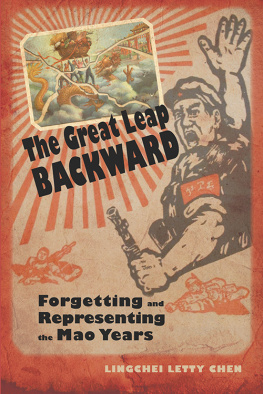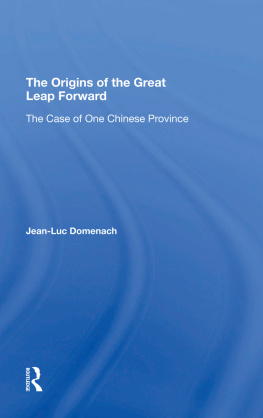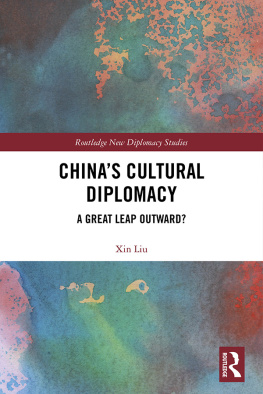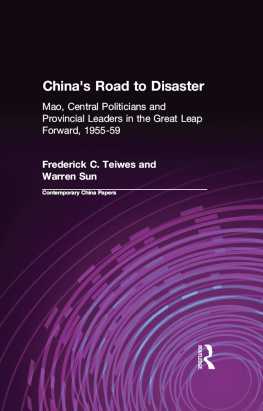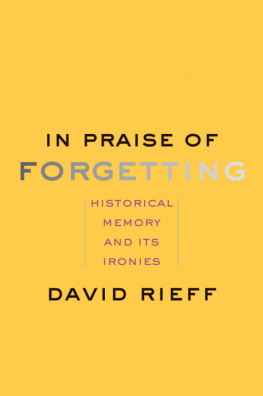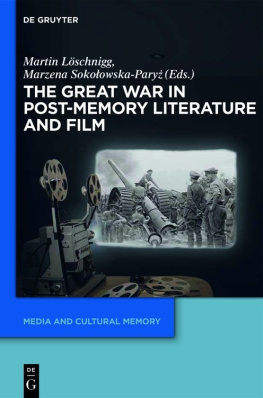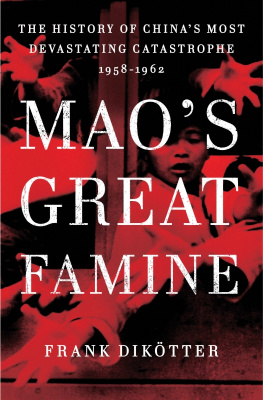About the Author
Lingchei Letty Chen is an associate professor of modern Chinese literature at Washington University in St. Louis. She holds a PhD from Columbia University, an MA from Columbia University, an MA from Old Dominion University, and a BA from Tamkang University. Dr. Chens previous publications include Writing Chinese: Reshaping Chinese Cultural Identity . She has published in journals such as Postcolonial Studies and Chinese Literature: Essays Articles Reviews .
Acknowledgments
Portions of this book have previously appeared in other publications. Parts of chapter 1 appeared as Writing Historical Trauma in the Everyday, in A Companion to Modern Chinese Literature , edited by Yingjin Zhang (West Sussex, UK: Wiley Blackwell, 2015). Parts of chapter 2 appeared as Remembering Perpetrators: Chinas Cultural Revolution (19661976), in Empire, Ideology, Mass Violence: The Long 20th Century in Comparative Perspective , edited by Tobias Hof (Munich: Herbert Utz Verlag, 2016). Chapter 5 is a revision of Translating Memory, Transforming Identity: Mnemonic Practice in Wild Swans , Tamkang Review 38, no. 2 (2008).
I have learned much from the Post/Memory Studies Reading Group at Washington University in St. Louis. I owe particular thanks to my graduate students and colleagues who have debated many of the ideas in the book with me. Everyone in my family has supported me through this long process, and so I dedicate this book to them.
Finally, I want to express my deepest gratitude to Professor Victor H. Mair, the general editor of the Cambria Sinophone World Series, and Toni Tan, the director of Cambria Press, for their commitment to making this book possible. Particularly I want to thank Toni for believing in this book. I also wish to thank the Cambria Press team for their meticulous, efficient, and exemplary professionalism. A special word of thanks to Brendan Moore, for his patient and wise guidance through the final preparation stages of this book.
Praise for The Great Leap Backward
Letty Chen has done magnificent work in looking into the art and politics of remembering, and re-membering, the Maoist eraits fanatic causes, its violent episodes, and its traumatic consequences. With sources drawn from fictional and biographical narratives, she identifies ideological and affective contestations, and ponders the possibilities of inscribing the immemorial and unthinkable. Both historically engaged and theoretically provocative, Chens book is a timely intervention with the prevailing narrative of the Chinese Dream. The Great Leap Backward is a compelling reference for anyone interested in memory studies, Chinese and comparative literature, and cultural and political history.
David Der-wei Wang,
Edward C. Henderson Professor of Chinese Literature,
Harvard University
* * * * *
A resounding call to read literature about what life was like during the Mao years as testimony, this truly first-rate book is impressive for its erudition, ingenuity, and readability. The image and memory of Mao Zedong still hold a powerful totemic sway over the Chinese populace. Wary of how the passage of time and the passing of witnesses may prompt history to accede to nostalgia with rose-tinted glasses, Letty Chen recalls and investigates situations where many fear to tread. Despite the heaviness of such subject matters as the Great Famine and the Cultural Revolution, Chens triangulation of personal memories, official accounts, testimonies, and theories is admirably balanced, deft, and steadyhanded. The field of modern Chinese literary studies has been waiting for a book like this. The Great Leap Backward will add an indispensable perspective to modern Chinese literature (as testimony) and the relations it has to historical events drenched in blood and tears. When put into words, memories of life during the Mao era have a better chance of surviving erasure; and with this book, the chances of their survival increase multifold. The Great Leap Backward will attract a wide variety of readers from comparative literature, Sinophone studies, modern Chinese literature, historical and memory studiesand for many years to come.
Chien-hsin Tsai,
Director of World Languages, City University of Seattle; and
author of A Passage to China and coeditor of Sinophone Studies
* * * * *
The first three decades of the Peoples Republic of Chinas history was dominated by a series of incessant and often violent political movements: from the Land Reform movement to the Anti-Rightist Campaign and from the Great Leap Forward to the Great Proletarian Cultural Revolution. However, as Letty Chen demonstrates in The Great Leap Backward: Forgetting and Representing the Mao Years , this crucial page in Chinas history has been repeatedly downplayed, whitewashed, or even erased in official narratives and discourse. Chens study involves piecing together the remnants of this history as told through a rich cross-section of contemporary fiction. Through her readings of writers like Mo Yan, Su Tong, Can Xue, Dai Houying, Yu Hua, and Yan Lianke, Chen not only excavates the underbelly of national history but also shines a bright light on some of contemporary Chinas most brilliant literary voices.
Michael Berry,
Director of the UCLA Center for Chinese Studies; and
author of A History of Pain and Speaking in Image
* * * * *
The Great Leap Backward provides illuminating new interpretations of canonical and popular literary representations of the Mao era, ranging from avant-garde and allegorical fiction to reportage and memoirs, as unsanctioned memories and testimonies. Drawing inspiration from Holocaust studies and its theoretical methodology, this books critical reflections on generational memory, victimhood, perpetration, guilt, and redemption make an important contribution to working through Chinas traumatic past amidst state-sponsored amnesia.
Jie Li,
John L. Loeb Associate Professor of the Humanities,
Harvard University
Cambria Sinophone World Series
General Editor: Victor H. Mair (University of Pennsylvania)
The members of the editorial board are:
- Michael Berry (UCLA)
- Wendy Larson (University of Oregon)
- Jianmei Liu (Hong Kong University of Science and Technology)
- Christopher Lupke (University of Alberta)
- Haun Saussy (University of Chicago)
- Carlos Rojas (Duke University)
- Tansen Sen (NYU Shanghai)
- Shu-mei Shih (UCLA)
- Jing Tsu (Yale University)
- David Der-wei Wang (Harvard University)
Books in the Cambria Sinophone World Series
The Great Leap Backward: Forgetting and Representing the Mao Years by Lingchei Letty Chen
Rethinking the Sinosphere: Poetics, Aesthetics, and Identity Formation edited by Nanxiu Qian, Richard J. Smith, and Bowei Zhang
Reexamining the Sinosphere: Transmissions and Transformations in East Asia edited by Nanxiu Qian, Richard J. Smith, and Bowei Zhang
Insects in Chinese Literature: A Study and Anthology by Wilt L. Idema
The Poetics and Politics of Sensuality in China: The Fragrant and Bedazzling Movement (1600-1930) by Xiaorong Li
Spatial Imaginaries in Mid-Tang China: Geography, Cartography, and Literature by Ao Wang
Texts and Transformations: Essays in Honor of the 75th Birthday of Victor H. Mair edited by Haun Saussy
Chinese Women Writers and Modern Print Culture by Megan M. Ferry
Reading Lu Xun Through Carl Jung by Carolyn Brown
Gao Xingjian and Transmedia Aesthetics edited by Mabel Lee and Liu Jianmei
Imperfect Understanding: Intimate Portraits of Chinese Celebrities edited by Christopher Rea
Zhang Yimou: Globalization and the Subject of Culture by Wendy Larson

